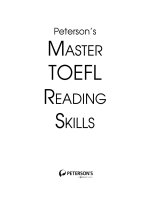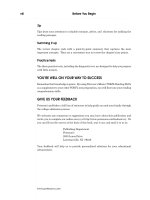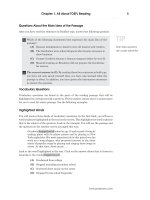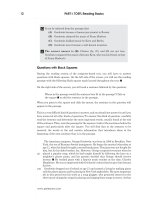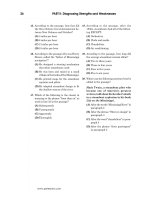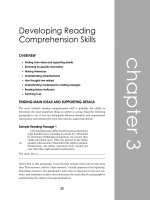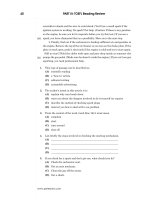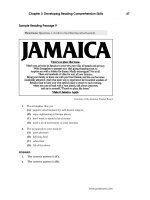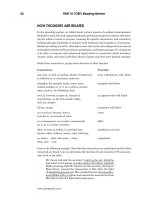Peterson’s master toefl reading skills part 3 pptx
Bạn đang xem bản rút gọn của tài liệu. Xem và tải ngay bản đầy đủ của tài liệu tại đây (75.96 KB, 7 trang )
Chapter 1: All About TOEFL Reading 5
www.petersons.com
Questions About the Main Idea of the Passage
After you have read the sentences in boldface type, answer the following question:
Which of the following statements best expresses the main idea of the
passage?
(A) Russian immigrants in America were all musical and creative.
(B) The Gershwins were school dropouts who became successes in
show business.
(C) George Gershwin became a famous composer before he was 30.
(D) Musical training on Broadway did not prepare the Gershwins
for success.
The correct answer is (C). By reading those four sentences in bold type,
you have not only saved yourself time, you have also learned what the
passage is about. In addition, you have gotten the information necessary
to answer the question.
Vocabulary Questions
Vocabulary questions are found in the parts of the reading passage that will be
highlighted to correspond with a question. This is another reason why it is unnecessary
for you to read the entire passage. See the following examples:
Highlighted Words
You will answer three kinds of vocabulary questions. In the first kind, you will see a
word or phrase highlighted in the text on the screen. This highlights the word or phrase
that is the subject of the question. Look at the example. You will see the passage and
the question on the monitor screen arranged this way:
Gershwin dropped out of school at age 15 and earned a living by
making piano rolls for player pianos and by playing in New
York nightclubs. His most important job in this period was his
work as a song plugger, who promoted interest in the sheet
music of popular songs by playing and singing those songs in
stores. At that time, sheet-music . . .
Look at the word highlighted in the text. Click on the answer choice that is closest in
meaning to the words dropped out of .
(A) Graduated from college
(B) Stopped attending secondary school
(C) Scattered sheet music on the street
(D) Dropped by his school frequently
TIP
Main idea questions
are usually asked first.
01_TOEFL Reading Ch 1,1-14 7/29/06, 11:475
6PART I: TOEFL Reading Basics
www.petersons.com
“Dropped out of” is an idiomatic expression, and if you are not acquainted with it, you
can still figure out the correct answer by looking at the other words in the sentence. You
can do this by mentally removing the words “dropped out of” from the sentence and
reading the sentence this way:
Gershwin __________ school at age 15 and earned a living by
making piano rolls for player pianos and by playing in New York
nightclubs.
Then, you fill in the blank with a verb that completes the sentence so that it is logical
and grammatically correct. The other words in the sentences contain clues. Look at the
words:
school at age 15 and earned a living by making piano rolls for
player pianos and by playing in New York nightclubs.
A 15-year-old person who earns a living by playing in New York nightclubs is not likely
to stay in high school at the same time. So, you choose a word or words that will finish
the sentence correctly. It’s not important what the words are; they can even be words
in your native language. The word or phrase you came up with is probably “quit” or
“withdrew from.”
Then, you compare your word to the answer choices:
(A) Graduated from college
(B) Stopped attending secondary school
(C) Scattered sheet music on the street
(D) Dropped by his school frequently
The correct answer is (B). The answer closest in meaning to “quit” or
“withdrew from.” Choice (A) is incorrect, because college is not mentioned
in the sentence. Choice (C) is incorrect, because the sentence is not about
sheet music. Choice (D) is incorrect and a tricky one, because “dropped out”
is close in sound to “dropped by,” which means visited.
Highlighted Sentences
Another type of vocabulary question asks you to read a boldface sentence, and choose
the correct definition of the highlighted word or phrase in that sentence.
Gershwin dropped out of school at age 15 and earned a living by making piano
rolls for player pianos and by playing in New York nightclubs. His most
important job in this period was his work as a song plugger, who
promoted interest in the sheet music of popular songs by playing and
singing those songs in stores. At that time, sheet-music sales were the
measure of a song’s popularity, and song pluggers had to work long hours
for the music publishers who employed them.
01_TOEFL Reading Ch 1,1-14 7/29/06, 11:476
Chapter 1: All About TOEFL Reading 7
www.petersons.com
Look at the words “promoted interest in the sheet music” in the passage. Click on the
word or phrase in the bold text that the words refer to.
(A) Sheet music sales
(B) A song’s popularity
(C) Song plugger
(D) Music publishers
On the computer screen, you will highlight those words and click them as your choice.
Which words would you choose?
(A) Sheet music sales
(B) A song’s popularity
(C) Song plugger
(D) Music publishers
The correct answer is (C). The highlighted words “who promoted
interest in sheet music” identify what song pluggers do.
Pronouns
Another kind of Reading question deals with pronouns. You will see a sentence in
boldface with a highlighted pronoun, and you will be asked to identify the noun that the
highlighted pronoun refers to. Look at the example:
However, George surprised everyone when he played a popular song, which he
had taught himself by following the keys on a neighbor’s player piano, and his
parents decided that George should receive lessons. He studied piano with a
famous music teacher at the time, Charles Hambitzer. He was so im-
pressed with Gershwin’s talent that he gave him lessons for free.
Look at the highlighted word. Click on the word or phrase in the bold text that the word
refers to.
(A) Piano
(B) Charles Hambitzer
(C) The Time
(D) Gershwin
The correct answer is (B). The pronoun “he” refers to a person, not to a
thing (“piano” and “time” are things). “He” also does not refer to Gershwin,
because Gershwin did not give lessons to himself, so “he” must refer to
Charles Hambitzer.
01_TOEFL Reading Ch 1,1-14 7/29/06, 11:477
8PART I: TOEFL Reading Basics
www.petersons.com
Detail Questions
You will have to answer detail questions at least twice per reading passage. In these
types of questions, you are asked about specific information in the text. First, read the
question to find out what information you have to find. Then, search for it in the text.
The American composer, George Gershwin, was born in 1898 in Brooklyn, New
York, the son of Russian-Jewish immigrants. He began his musical education at
age 11, when his family bought a second-hand piano. The piano was not bought for
him, but for his older brother, Ira. However, George surprised everyone when he
played a popular song, which he had taught himself by following the keys on a
neighbor’s player piano, and his parents decided that George should receive
lessons. He studied piano with a famous music teacher at the time, Charles
Hambitzer. He was so impressed with Gershwin’s talent that he gave him lessons
for free.
According to the passage, who did the Gershwin parents buy the piano for?
(A) George Gershwin
(B) Charles Hambitzer
(C) Other Russian immigrants
(D) Ira Gershwin
The correct answer is (D). In lines 3–4 above, the passage states that
Gershwin’s parents bought the piano for George’s brother Ira.
Look for the Important Words
Detail questions contain important words that will lead you to the answer. They are not
words such as “George Gershwin” or “composer.” They are words that specify the
information that will answer the question for you.
In the question, the words “buy the piano” are the most important words to help you find
the answer. Instead of reading the entire passage, scan the passage for those words. You
find it at the end of the second sentence and see that the correct answer is (D).
Look at the next example:
The American composer, George Gershwin, was born in 1898 in Brooklyn, New
York, the son of Russian-Jewish immigrants. He began his musical education at
age 11, when his family bought a second-hand piano. The piano was not bought for
him, but for his older brother, Ira. However, George surprised everyone when he
played a popular song, which he had taught himself by following the keys on a
neighbor’s player piano, and his parents decided that George should receive
lessons. He studied piano with a famous music teacher at the time, Charles
Hambitzer. He was so impressed with Gershwin’s talent that he gave him lessons
for free.
(5)
(5)
01_TOEFL Reading Ch 1,1-14 7/29/06, 11:478
Chapter 1: All About TOEFL Reading 9
www.petersons.com
According to the passage, why did George’s piano teacher give him lessons
for free?
(A) His parents were too poor to pay for the lessons.
(B) The teacher was impressed with George’s talent.
(C) Famous piano teachers never received money from their
students.
(D) Popular music was more important than classical music.
The correct answer is (B). The most important words in the question are
“lessons for free.” When you scan for those words, you will find them in the
last sentence of the paragraph.
Once again, repeat to yourself the most important strategy of answering questions in
the reading section:
DO NOT READ THE ENTIRE PASSAGE BEFORE
YOU START ANSWERING THE QUESTIONS!
Questions with
Except
and
Not
The following is an example of “Except/Not” questions:
All of the following are mentioned as members of the French Impressionist
group EXCEPT
(A) Edgar Dégas.
(B) Camille Pissaro.
(C) Rembrandt van Rijn.
(D) Mary Cassat.
In this question, you look for the answer that names a painter who is NOT
a French Impressionist. In this case, it is choice (C), Rembrandt van Rijn.
Whenever you see this kind of question, remember that the answer is the one that is
different from the others. Sometimes an answer has nothing to do with the main topic.
In the above example, choice (C) might have been “Honore de Balzac,” who was French
but not a painter.
These kinds of questions will be asked at least four times per passage. Look at the
following example:
The American composer, George Gershwin, was born in 1898 in Brooklyn, New
York, the son of Russian-Jewish immigrants. He began his musical education at
age 11, when his family bought a second-hand piano. The piano was not bought for
him, but for his older brother, Ira. However, George surprised everyone when he
played a popular song, which he had taught himself by following the keys on a
neighbor’s player piano, and his parents decided that George should receive
(5)
01_TOEFL Reading Ch 1,1-14 7/29/06, 11:479
10 PART I: TOEFL Reading Basics
www.petersons.com
lessons. He studied piano with a famous music teacher at the time, Charles
Hambitzer. He was so impressed with Gershwin’s talent that he gave him lessons
for free.
Gershwin dropped out of school at age 15 and earned a living by making piano
rolls for player pianos and by playing in New York nightclubs. His most important
job in this period was his work as a song plugger, who promoted interest in the
sheet music of popular songs by playing and singing those songs in stores. At that
time, sheet-music sales were the measure of a song’s popularity, and song pluggers
had to work long hours for the music publishers who employed them. As a result
of his hard work, Gershwin’s piano technique improved greatly, so much so that,
while still in his teens, Gershwin became known as one of the most talented
pianists in New York City. As a result, he worked as an accompanist for popular
singers and as a rehearsal pianist for Broadway musicals.
His knowledge of jazz and popular music grew quickly, and one of his songs was
included in the Broadway musical The Passing Show of 1916. George became
friends to many prominent Broadway composers. He particularly admired the
music of Irving Berlin whom Gershwin called “America’s Franz Schubert.” Jerome
Kern, another Broadway composer, demonstrated to George how popular music
was inferior to material in Broadway shows. In 1919, entertainer Al Jolson
performed Gershwin’s song Swanee in the musical Sinbad. The song became a hit,
and Gershwin became an overnight celebrity when his song sold more than 2
million recordings and a million copies of sheet music.
All of the following are reasons that George Gershwin became a success
while he was young EXCEPT
(A) He studied piano with a famous teacher.
(B) He learned about jazz and popular music while he worked as a
song plugger.
(C) He graduated from high school when he was only 15.
(D) He worked as an accompanist for popular singers in New York.
The correct answer is (C). To answer this question correctly, you have
to determine the time period of each answer. In the text, in what order were
the answers stated? If you scan the passage you will see that the order is
(A), (C), (B), and (D).
Choices (A) and (C) appear in the first paragraph, where you read that
Gershwin studied with a famous teacher, which is the statement in choice
(A). You also read that Gershwin’s parents bought a piano for his brother,
which means that Gershwin’s parents did NOT give him a piano.
Choices (B) and (D) give reasons why Gershwin became a success while he
was young.
(10)
(15)
(20)
(25)
01_TOEFL Reading Ch 1,1-14 7/29/06, 11:4710
Chapter 1: All About TOEFL Reading 11
www.petersons.com
Questions with “Imply” and “Infer”
To imply something is to “communicate an idea without stating it directly.” To infer
something is to “understand the idea that is being communicated by another person,
even though the other person does not say it directly.”
For example:
Mildred said to Mark, “Harry is moving to Japan permanently,
but he doesn’t know how to speak Japanese.”
Mildred implied that Harry would have to learn Japanese. Mark inferred that Harry
would have to learn Japanese.
During the Reading section, you will be asked questions that begin in the
following way:
It can be inferred from the passage that . . .
The author implies that . . .
The passage suggests that . . .
Based on the information in the passage, what can be inferred about . . .
The answer to these questions is always in the form of a paraphrase. It repeats an idea
found in the passage but expresses it in a different way.
To answer these questions, first eliminate as a possible correct answer anything that
is ridiculous and illogical. Also, eliminate any answer choice that introduces material
not discussed in the passage. Answer choices that contain words such as “always,”
“never,” and “completely” are usually incorrect, so you can eliminate them. If an answer
choice simply repeats word-for-word a lot of material from the passage, you can
eliminate that answer as well. Answer choices that are longer than the other answer
choices are often a trap.
Answer the following question:
His knowledge of jazz and popular music grew quickly, and one
of his songs was included in the Broadway musical The Passing
Show of 1916. George became friends to many prominent
Broadway composers. He particularly admired the music of
Irving Berlin whom Gershwin called “America’s Franz
Schubert.” Jerome Kern, another Broadway composer, demon-
strated to George how popular music was inferior to material in
Broadway shows. In 1919, entertainer Al Jolson performed
Gershwin’s song Swanee in the musical Sinbad. The song
became a hit, and Gershwin became an overnight celebrity
when his song sold more than 2 million recordings and a million
copies of sheet music.
(5)
(10)
01_TOEFL Reading Ch 1,1-14 7/29/06, 11:4711
